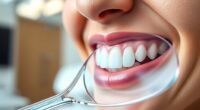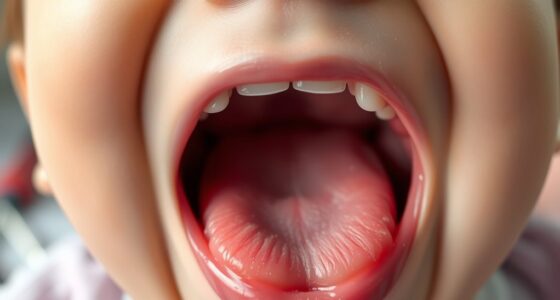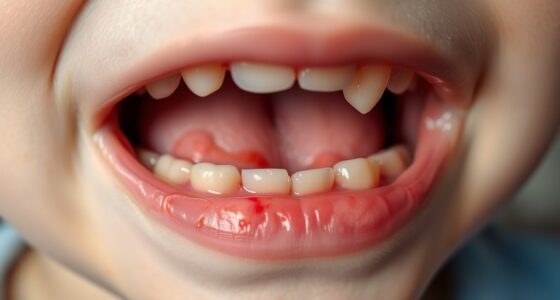Getting your child ready for back-to-school starts with scheduling a dental checkup early to catch issues and consider sealants or fluoride treatments. Encourage consistent brushing twice daily and flossing to keep teeth clean. Promote healthy snacks and water over sugary drinks to protect enamel. Equip children with proper protective gear for sports, and plan appointments around busy school schedules. Keep supplies fresh, and stay proactive about preventive care—more tips to help make this year your child’s healthiest smile.
Key Takeaways
- Schedule preventive dental checkups early in the school year to identify and address oral health issues promptly.
- Encourage consistent brushing and flossing routines using fun tools and visual aids to build good habits.
- Promote healthy snacks like cheese, nuts, and vegetables while limiting sugary, sticky treats and drinks.
- Ensure children wear properly fitted mouthguards and safety gear during sports to prevent dental injuries.
- Plan dental appointments around school breaks to minimize missed classes and maintain regular oral health care.
Schedule a Back-to-School Dental Checkup

Scheduling a dental checkup before school starts is a smart way to catch and address dental issues early on. A back-to-school dental appointment helps identify problems like cavities or misalignment before they worsen, reducing missed school days due to dental emergencies. The American Academy of Pediatric Dentistry recommends kids visit the dentist at least twice a year for routine exams and cleanings, ensuring their oral health stays on track. During these preventive care visits, professionals can apply sealants and fluoride treatments to strengthen teeth and prevent cavities. Booking your child’s dental appointments early ensures their oral health is maintained without last-minute scheduling conflicts during busy back-to-school weeks. Regular checkups promote good habits and foster a positive attitude toward dental care for a lifetime of healthy smiles. Additionally, early visits can help identify signs of dental health issues such as gum disease, which can impact overall health if left untreated. Incorporating preventive care into your child’s routine can significantly reduce the likelihood of more serious dental problems later on. Understanding the importance of early intervention can motivate parents to prioritize their children’s dental health. Consistent dental hygiene practices foster healthier teeth and gums as children grow.
Promote Consistent Brushing and Flossing Routines

Once your child’s dental checkup is complete, establishing a consistent brushing and flossing routine becomes key to maintaining their oral health. Encourage them to brush twice daily for two minutes, using a timer or fun song to make it engaging. Reinforce the importance of flossing once daily after dinner to remove plaque and food particles between teeth. Use visual aids like sticker charts to track their habits and reward progress, motivating them to stay consistent. Teach proper brushing techniques, such as gentle circular motions covering all surfaces and gumline. A solid routine helps prevent cavities, gum disease, and promotes overall oral health. Additionally, understanding the role of oral hygiene in overall health emphasizes the importance of maintaining these routines daily. Regular brushing and flossing can also contribute to better home heating solutions, as healthy oral habits reduce the risk of infections that can affect overall well-being. Developing these habits early helps prevent dental decay and lays the foundation for lifelong dental health and preventive care, ensuring your child’s smile stays bright and healthy. Incorporating consistent oral hygiene practices into daily routines can also reduce the need for extensive dental treatments later in life.
Encourage Healthy Snacking and Dietary Choices

Encouraging your child to make healthy snack choices plays an essential role in protecting their teeth. Offering healthy snacks like cheese, nuts, and crunchy vegetables provides critical nutrients while reducing sugar intake that can lead to cavities.
Limiting or avoiding sticky, sugary treats such as candies, granola bars, and fruit snacks helps prevent plaque buildup and tooth decay. Incorporating dental health-friendly foods into their diet supports stronger enamel and overall oral health. These food choices also reduce the risk of developing tooth erosion, which can compromise dental integrity over time.
Replacing processed snacks like chips and crackers with whole foods also supports better oral hygiene by decreasing acid-producing bacteria in the mouth. Regularly choosing nutrient-rich options can further enhance dental strength and resilience.
Additionally, encouraging water instead of sugary drinks or juice minimizes sugar exposure, strengthening dental health.
Teaching your child about nutritious snack options fosters better dietary habits, ultimately safeguarding their teeth from decay and enamel erosion, and promoting a lifetime of healthy smiles.
Use Protective Gear for Sports and Play

Wearing the right protective gear during sports and play is essential for safeguarding your child’s dental health. A properly fitted mouthguard can reduce sports injuries by up to 60%, preventing fractures, tooth avulsion, and soft tissue injuries. For children with braces or orthodontic appliances, custom-made mouthguards provide superior protection and comfort compared to over-the-counter options. Along with mouthguards, helmets and face shields help prevent dental trauma from falls or collisions. Guarantee your child’s gear fits well and is replaced when worn out to maintain protection. Properly maintained protective equipment can significantly extend its lifespan and effectiveness. Regularly inspecting and cleaning sports gear ensures optimal performance and hygiene. It’s also important to consider that celestial influences are thought by some cultures to have an impact on personal traits, including attractiveness, which emphasizes the importance of confidence and self-care. Here’s a quick overview:
| Protective Gear | Benefits | Recommendations |
|---|---|---|
| Mouthguard | Prevents dental trauma | Use custom-made for best fit |
| Helmets & Face Shields | Reduce impact injuries | Replace if damaged or ill-fitting |
| Proper Fit | Ensures maximum protection | Regularly check and adjust fit |
| Replacement | Maintains safety during active play | Replace every sports season or as needed |
A well-fitted protective gear can significantly decrease the risk of dental injuries during active play.
Maintain Proper Toothbrush and Oral Hygiene Supplies
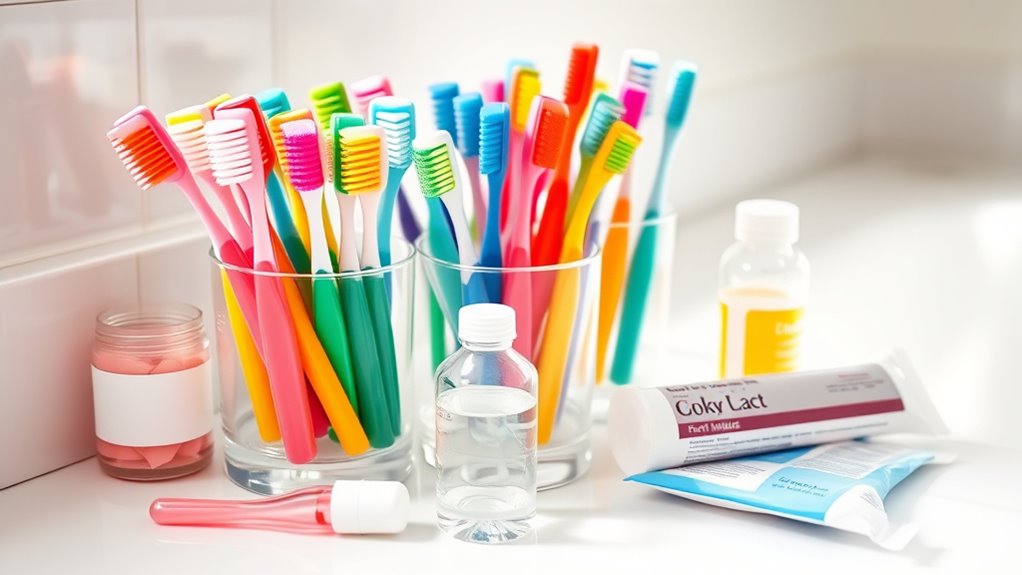
Maintaining proper toothbrush and oral hygiene supplies is essential for your child’s dental health. Regularly replacing the toothbrush every three months or sooner if bristles are frayed guarantees effective cleaning. Choose a toothbrush with soft bristles and a small head to reach all areas comfortably, supporting good dental care. Incorporating innovative AI-driven tools can help monitor and remind children to maintain their oral hygiene routines effectively. During back-to-school season, remind your child to store their toothbrush upright and let it air dry between uses to prevent bacterial growth. To make oral hygiene routines more appealing, consider toothbrushes with fun designs or favorite colors. If storing multiple toothbrushes together, keep them separate and covered to avoid cross-contamination. Proper supplies and habits help maintain oral hygiene, reduce cavities, and promote healthy teeth throughout the school year. Additionally, paying attention to air purifier maintenance can create a healthier environment that supports overall well-being during busy school months. Regularly cleaning and replacing filters in air purifiers enhances indoor air quality and further contributes to your child’s overall health.
Plan for Preventive Treatments Like Sealants and Fluoride
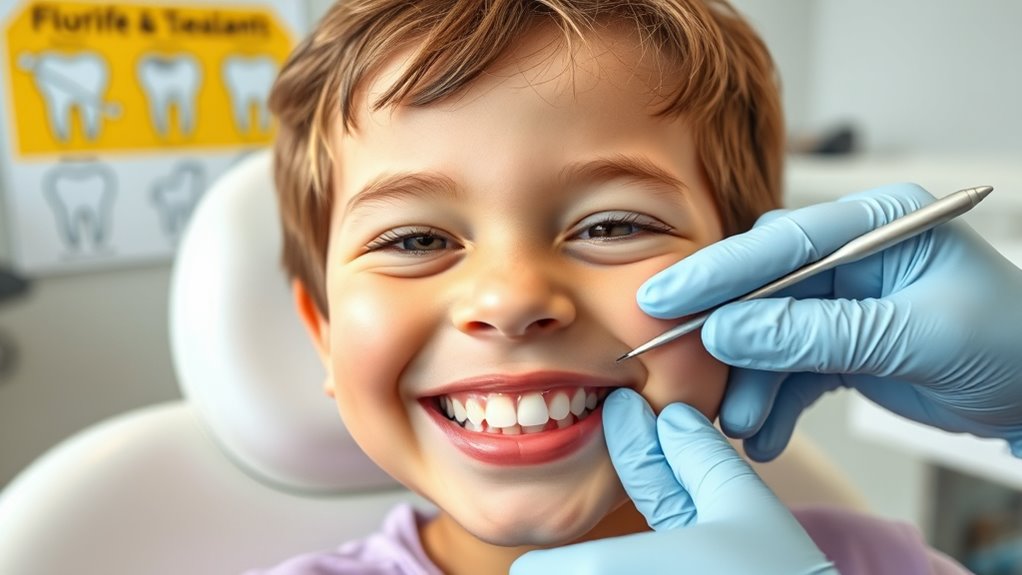
Planning preventive treatments like sealants and fluoride can substantially reduce your child’s risk of cavities. Sealants protect molars early on, while fluoride strengthens teeth over time. Using dental product reviews can help you choose the most effective options for your child’s needs. Scheduling these treatments at the right moments ensures your child’s smile stays healthy throughout the school year.
Benefits of Sealants
Applying sealants is a highly effective way to prevent cavities, especially on the chewing surfaces of your child’s molars. Dental sealants protect deep pits and grooves, areas prone to decay, by forming a barrier that blocks food and bacteria. Studies show that sealants can reduce cavity risk in treated teeth by up to 80%, making them a vital part of cavity prevention. When combined with fluoride treatments, which strengthen enamel and help remineralize early decay, sealants offer long-lasting protection. Regular dental visits ensure proper application and monitoring of these preventive measures. Starting sealant applications as early as age 6, when permanent molars emerge, helps safeguard your child’s teeth for years to come, reducing the need for future dental treatments. Additionally, keto diet apps can be useful for tracking dietary habits that support overall health, including oral health. Incorporating preventive dental care into your child’s routine is essential for maintaining healthy teeth throughout their lifetime. Moreover, implementing educational programs about oral hygiene can further reinforce good habits at home. Staying informed about dental statistics can motivate ongoing commitment to preventive practices.
Fluoride Treatments Effectiveness
Fluoride treatments are a proven way to strengthen your child’s enamel and make their teeth more resistant to cavities. By applying fluoride varnishes or gels, you can boost enamel strength and reduce the risk of dental decay. Studies show that professional fluoride applications can decrease cavity rates in children by up to 25-30%, making them an essential part of preventive care. When combined with daily brushing with fluoride toothpaste, fluoride treatments become even more effective. The American Dental Association recommends these treatments for children at higher risk of cavities, especially if there are early signs of decay or poor oral hygiene. Together with sealants, fluoride treatments offer a *holistic* approach, helping to protect your child’s teeth and promote long-term oral health. Additionally, fluoride’s protective properties are well-documented, emphasizing its role in comprehensive dental care.
Timing Preventive Procedures
Scheduling preventive treatments like sealants and fluoride applications early in the school year helps guarantee your child stays protected without missing important classes. Planning dental appointments during school holidays or early release days minimizes disruptions to their school schedule. Utilizing natural materials in the dental office, such as wood or stone decor, can create a calming environment that eases children’s anxiety during visits. Applying sealants on molars soon after they erupt prevents decay in deep grooves that are hard to clean. Regular fluoride applications, as recommended by your dentist, strengthen enamel and decrease cavity risk during the school year. Incorporating preventive dental care into your child’s back-to-school routine can also promote overall oral health habits that last a lifetime. Early timing for these preventive treatments ensures your child maintains good oral health, reducing the chances of dental emergencies that could interfere with attendance. Coordinating with your child’s dental provider now helps create a seamless plan, so they stay protected without missing valuable classroom time. Understanding topical fluoride treatments can further enhance your child’s cavity protection strategy during the school months. Additionally, scheduling these treatments during dental check-ups allows for comprehensive care and monitoring of your child’s oral health progress. Being aware of proper oral hygiene practices at home can reinforce the benefits of professional preventive treatments.
Coordinate Dental Appointments With School Schedules

To minimize missed class time, it’s best to plan dental appointments during school holidays, early release days, or weekends. Check your school district’s calendar or contact the school to identify the best times that avoid exam periods and busy schedules.
Booking routine checkups and dental cleanings well in advance guarantees you can select dates that fit your child’s school schedule. If appointments must occur during school hours, ask your dental provider for excuse forms to provide proper absence documentation.
Scheduling these visits around school activities helps keep your child’s routine intact and prevents unnecessary disruptions. By coordinating dental appointments with the school calendar, you’ll help your child stay on top of their back-to-school routine without missing important classes or activities.
Frequently Asked Questions
How to Survive Dental Hygiene School?
To survive dental hygiene school, stay committed to practicing your skills daily and actively seek feedback from instructors. Keep up with the latest oral health knowledge, and don’t hesitate to ask questions.
Use your tools correctly, stay organized, and maintain good time management. Building strong study habits and practicing self-care will help you stay motivated and succeed throughout your coursework.
What Is the 2 2 2 Rule for Brushing Teeth?
You mightn’t realize it, but the 2-2-2 rule is a simple yet powerful way to keep your teeth healthy.
It means brushing twice a day for two minutes each time. By doing this, you remove plaque effectively and prevent cavities.
To make it easier, try using a timer or playing a two-minute song.
Stick to this routine consistently, and you’ll develop good habits for lifelong oral health.
How Do I Prepare Myself for Dental School?
To prepare for dental school, start by researching the required courses and prerequisites so you can plan your academic path. Gain hands-on experience by shadowing dentists or volunteering in clinics to understand the profession.
Strengthen your communication, organization, and time-management skills to handle rigorous coursework. Study for the DAT, focusing on sciences, reading, and perceptual tests.
Maintain a strong GPA, seek good recommendations, and get involved in relevant activities to make your application stand out.
What Are Tips to Improve Your Dental Health?
To improve your dental health, you should brush twice a day with fluoride toothpaste for two minutes, making sure to reach all surfaces.
Floss daily to remove debris between teeth and prevent gum disease.
Cut back on sugary snacks and drinks, which feed harmful bacteria.
Visit your dentist every six months for checkups.
Use age-appropriate dental products and protective gear like mouthguards to support healthy development.
Conclusion
By staying proactive with your child’s dental care, you’re setting them up for a healthy, confident smile all year long. Regular checkups, good habits, and proper protection are key. Are you ready to prioritize their oral health and make this school year the best one yet? Remember, a little effort now can prevent bigger problems later—so don’t wait to give your child the dental care they deserve.

